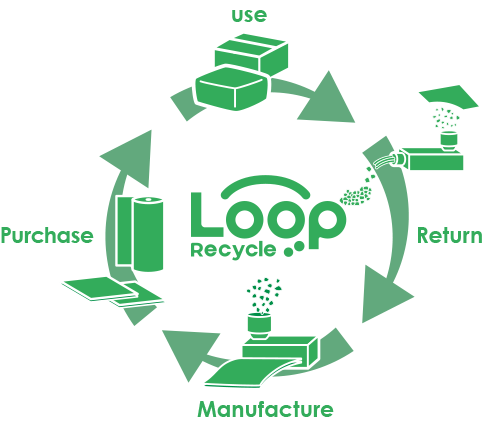Puti-Puti
We manufacture bubble sheet called “putiputi” in Japan.Putiputi is made of Recycled PE and air.

Kawakami Sangyo began using recycled raw materials in 2004. As a leading manufacturer of bubble cushioning materials, we are working to build a platform for domestic circulation of plastic resources to achieve zero plastic waste, effective use of resources, and reduction of CO2 emissions throughout our business activities.
In order to eliminate plastic waste, make effective use of resources, and reduce CO2 emissions, we are working to build a plastic recycling platform that collects used bubble wrap, plastic bags, stretch film, etc., not only from our own products but also from our customers, and recycles them back into products. This cycle is called “Loop recycling,” and after being collected from customers, it is sorted and processed into products after being re-pelletized at a recycled material manufacturer.
Focusing on our own Puti-Puti (bubble cushioning material), we collect plastic bags, stretch film, and other materials used in factories and stores in cooperation with plastic recycling partners, and manufacture them as recycled products. This initiative is called “Loop Recycling,” and we are working together to build a recycling system in which we work to recycle resources while asking for the cooperation of the collection sites in sorting the materials. We aim to further expand the recycling system in the future.

Puti-Puti is an important recyclable resource. We have been conducting the “Puti-Puti Recycling Project” since 2021 to collect used Puti-Puti (bubble cushioning material) from ordinary households and other locations. We aim to install dedicated collection boxes at local governments, schools, public facilities, and other locations throughout Japan.
We started manufacturing Puti-Puti in 1968 and began using recycled raw materials in 2004. At the time, it was extremely difficult to ensure product quality using recycled materials, and there were few products in the world that used recycled materials, but we conducted our own research and development and increased the use of recycled materials year by year. Now, more than 90% of all Puti-Puti is made from recycled raw materials. We are now using recycled raw materials for more than 90% of all Puti-Puti products. We are also contributing to further resource recycling by blending used Puti-Puti and other materials.
When procuring recycled raw materials, it is extremely difficult to find those with the desired physical properties. Therefore, we adjust the physical properties of recycled raw materials to make them easier to mold and process according to the molding application. We can assist companies that wish to reuse unwanted plastics generated by their own operations, as well as processing manufacturers that are not accustomed to handling recycled raw materials. We can make proposals on the compounding of recycled raw materials alone, so please feel free to contact us if you have any questions or concerns.
To make people aware that Puti-Puti can be recycled as a resource, we organize events in schools and commercial establishments, where students can experience Puti-Puti collection and simple recycling.
Domestic recycling of plastic resources is not something that can be done by a single company. In order to work together with various communities, we are actively participating in government projects such as JCEP.
We are participating in the GREEN SEA Setouchi Hiroshima Platform.
We are registered as a “Sapporo Eco-member” (registration category level 3).
*Under this system, business establishments that voluntarily implement environmentally friendly initiatives are registered as “Sapporo Eco-members.
In addition to plastics, we are developing products using eggshells and buckwheat hulls, which would otherwise be discarded.